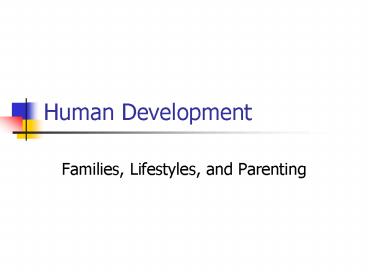Human Development PowerPoint PPT Presentation
1 / 29
Title: Human Development
1
Human Development
- Families, Lifestyles, and Parenting
2
Family Life Cycle(Carter McGoldrick, 1989)
- Leaving home single adult- launching
- New Couple marriage impact on identity
- Becoming a parent
- Parenting adolescents
- Midlife grown children midlife changes
- Later life retirement
3
Critique
- The typical family may have less relevance
today - Stages may not occur in this order
- Diversity within each stage
4
Reciprocal Socialization
- Interactions between parents and children are
bidirectional - Children socialize their parents as parents
socialize their children
5
Systems View
- The family is a system with several subsystems
- Entire family
- Mother-son relationship brother-sister
relationship, etc.
6
Systems View
- The role of family dynamics
- Happily married parents- more responsive to
children - Couples in conflict- more likely to physically
punish children
7
Family in Socio-cultural and Historical Context
- The role of social context
- Great Depression Post-9/11 world
- Increase in life expectancy caring for aging
parents
8
Media Representations of Family
- Television programs represent middle income
families - Media images of various families
9
Single Adults
- Dramatic rise in percentage of single adults in
the U.S. - 1970 8 of adults lived alone
- 2000 25 of adults lived alone
10
Single Adults
- swinging singles and desperately lonely
adults stereotypes - Pros and cons of being a single adult
- 8 of individuals aged 65 have never married
cope best with loneliness in old age
11
Cohabitation
- As of 2000, 60 of couples were cohabitating
- Research no differences or slightly less
successful marriages - Less defined gender roles as compared to married
couples
12
Marital Trends
- Average age 25 for women, 27 for men
- Staying single longer
- High divorce rate, but declining
13
Successful Marriages
- Close friendship
- Compromise
- Maintaining a positive view of ones spouse
- Shared meaning/shared worlds
14
Marriage Individual Outcomes
- Unhappy marriages increases risk of health
problems, shortens life expectancy - Happy marriages increases life expectancy
15
Changes in the Marital Relationship
- Marriages may become better adjusted in middle
adulthood - Most older adults report happy marriages
16
Divorce
- Risk factors for divorce
- Youthful marriage
- Low educational level
- Low income
- Premarital pregnancy
17
Divorce Individual Outcomes
- Great variability in our reactions to divorce
- Increase in competence
- good-enough little movement
- Seeking new relationships
- Increase in casual sex
- Little interest in new relationsihps
- Despair
18
Causes of Divorce
- Women
- Abuse
- Drug involvement
- Cheating
- Men
- Fell out of love
- Cheating
- Different values
19
Gay Couples
- Same concerns as heterosexual couples
- Prefer committed relationships
- Do not usually conform to masculine-feminine
stereotype
20
Gay Couples
- Children of gay couples
- No difference in adjustment compared with
children of heterosexuals - No difference in mental health
- Most children grow up to be heterosexual
21
Baumrind Parenting Styles
- Authoritarian rigid rules, demands obedience
children have few rights, many responsibilities - Outcomes obedient, controlled, emotionally
stiff, apprehensive, lacking in curiosity - Potential drug use and violence in adulthood
22
Baumrind Parenting Styles
- Authoritative firm and consistent, loving and
affectionate. Responsive, willing to explain
their reactions. - Outcomes children are competent, independent,
assertive, inquiring
23
Baumrind Parenting Styles
- Overly Permissive children are given little
guidance, lots of freedom no accountability
children have rights of adults, but few
responsibilities - Outcomes children are dependent, immature, and
have behavior issues
24
Discipline
- U.S. and Canada most favorable attitudes toward
corporal punishment - Sweden least favorable
- Sweden, Israel, Denmark, Norway, Austria, and
others have outlawed spanking
25
Corporal Punishment
- Associated with
- immediate compliance
- Aggression
- lower levels of moral internalization
- poor mental health
- Parents may appear out-of-control, models
problematic behavior
26
Child Abuse Cultural Context
- Child abuse is less frequent in cultures which
discourage it - In the U.S., abuse is frequent in families with
insufficient resources - Role of isolation
- Little help from others
27
Intergenerational Hypothesis
- Children who were abused are more likely to
become abusers - Breaking the cycle
- Presence of one caring adult
- Close marital relationship
- Therapy
28
Children of Divorce
- Children of divorce are more prone to adjustment
problems - Divorce can be beneficial, based on the context
- Cordial relationships between divorced parents
are helpful
29
Sibling Relationships
- Can be extremely close, apathetic, or rivalrous
- Family dynamics may continue throughout the adult
years - Emotional cutoffs are rarely successful

